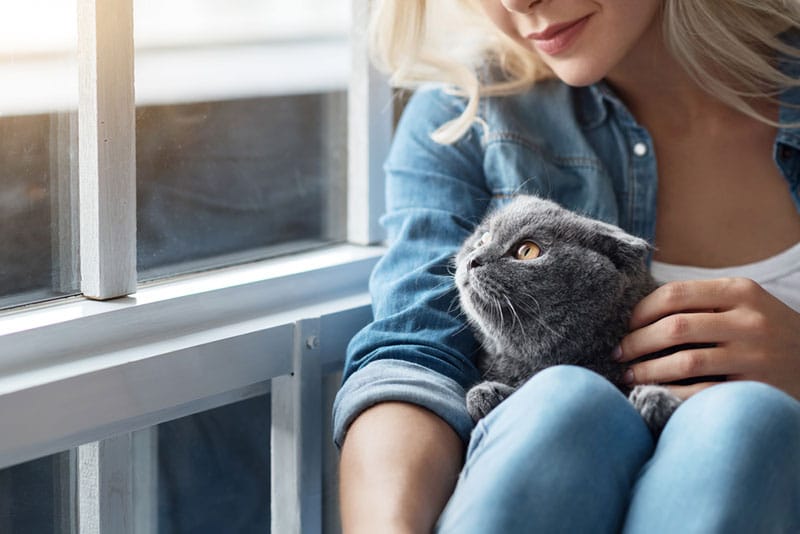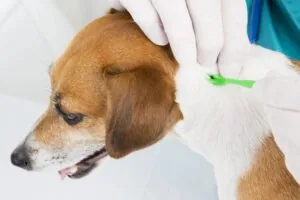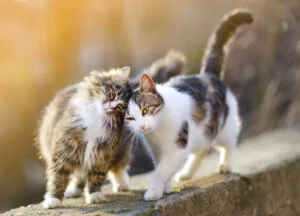What Cat Owners Should Know About Chronic Kidney Disease

Kidneys play an important role in the health of cats. Not only are they responsible for producing urine, they also filter the blood of impurities. Improperly functioning kidneys can lead to a buildup of toxins in the bloodstream and can become fatal. Chronic kidney disease (CKD) is one of the most common ailments suffered by cats. While cats of any age can experience chronic kidney disease, it is most common in those over the age of seven. The risks increase as the cat gets older. Nearly one in three cats will experience some degree of CKD over their lifetime.
Causes
In most cats with chronic kidney disease, the exact cause is unknown. However certain risk factors can predispose your cat to develop CKD.
- Congenital – This means that the cat was born with a defect in the kidneys or the renal system.
- Multiple kidney/urinary tract infections
- Urinary tract obstructions
- Exposure to toxins – heavy metals, certain antibiotics, NSAIDS (non-steroidal anti-inflammatories)
- Diseases such as FIV, feline leukemia, lupus, or diabetes
- Breed – Persians, Maine Coons, and Abyssinians have been known to develop CKD at higher rates.
Research is ongoing to find the underlying cause of CKD, as most cats simply develop CKD over a period of time. However, if one of these risk factors are identified, immediate treatment can help reduce the threat of further kidney damage.
Signs and Symptoms
Because the kidneys serve so many functions, the signs and symptoms of CKD are wide-ranging. Often, the signs are subtle at first and mimic other illnesses. Most kidney disease has a gradual onset and signs and symptoms may not be obvious in the early stages. The following signs and symptoms of CKD should be noted.
- Decreased appetite
- Increased thirst
- Increased urination
- Blood in urine
- Loss of appetite
- Lethargy
- Weight loss
- Vomiting
- Diarrhea
- Constipation
If your cat displays any of these signs or symptoms, they should be checked by your veterinarian.
Diagnosis
Your veterinarian can usually diagnose CKD in your cat by a blood test and a urinalysis. In a blood test, your veterinarian will be looking at various indicators regarding your cat’s kidney function. Two of these will be blood urea nitrogen (BUN) and creatinine. An increased level of either of these waste products can indicate that the kidneys are not properly filtering waste products from the blood. Your veterinarian may also look at electrolyte levels (e.g. potassium and sodium), proteins, and red blood cells.
A urinalysis is another tool that your veterinarian can use to aid in diagnosing CKD. He or she will be looking at the concentration of the urine, the urine pH, and for the presence of protein, bacteria, certain cells (such as red blood cells) which are not found in the urine of healthy cats. Your veterinarian may perform a urine culture just to rule out a bacterial infection.
More extensive evaluations may be needed to diagnose CKD. It is possible that your veterinarian may want to perform an x-ray or ultrasound to look at the kidneys. A biopsy may also help in diagnosis.
Treatment
Unfortunately, there is not a cure for chronic kidney disease in cats. Treatment focuses on slowing the progression of the disease and helping your cat remain as healthy as possible to prolong his or her life. It is important to control the buildup of toxins in the blood. The prognosis is different for each case and depends on the severity of damage to the kidneys.
Diet
Dietary modification has proven to be the most effective treatment for CKD. Your veterinarian is most likely going to recommend a certain type of food specifically for cats that have problems with their kidneys. These special foods usually contain high-quality protein, low sodium, low phosphorus, and low calcium. Foods with water-soluble vitamins, fiber, and antioxidants are also beneficial. Many of these specialty foods can be purchased through your veterinarian. Your veterinarian can also give you tips on how to introduce a new diet to your cat. As we all know, cats can be finicky eaters, but it is important that they eat properly to maintain kidney function.
Hydration
It is important that your cat maintains proper fluid balance. Be sure that he or she always has access to clean fresh water. Frequently check their water dish since cats with kidney disease may drink more than usual. Your veterinarian may want to give fluids intravenously (through a vein) or subcutaneously (under the skin). Feeding your cat a moisture-dense (canned) food can also help in maintaining proper hydration.
What You Can Do
The most important thing you can do is ensure your cat receives annual check-ups with his or her veterinarian. Since routine lab work (blood tests and urinalysis) can detect early signs of CKD, it is important that cats over the age of seven (or as recommended by your veterinarian) have these tests done annually. Prompt treatment of other ailments such as high blood pressure, urinary tract/kidney infections, and diabetes can help delay the onset of kidney disease.
It is unfortunate that chronic kidney disease is so prevalent in cats. Research is ongoing to find the underlying causes, earlier detection, and improved treatments of CKD. Luckily, routine testing can usually raise some red flags and together with your veterinary team, you can develop a treatment plan to prolong the life of your cat. Remember the importance of regular check-ups!
Share This Post
Recent Posts
About Shallowford Animal Hospital
Shallowford Animal Hospital and The Pet Spa at Shallowford are dedicated to the exceptional, compassionate care your pet deserves. Pets hold a very special place in our families, and we treat yours like our own.



